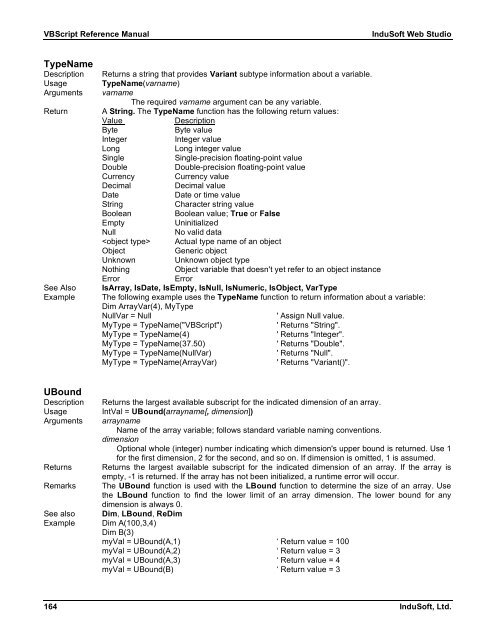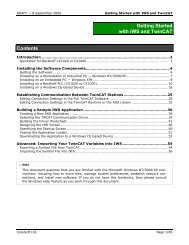VBScript Reference Manual for InduSoft Web Studio
VBScript Reference Manual for InduSoft Web Studio
VBScript Reference Manual for InduSoft Web Studio
Create successful ePaper yourself
Turn your PDF publications into a flip-book with our unique Google optimized e-Paper software.
<strong>VBScript</strong> <strong>Reference</strong> <strong>Manual</strong> <strong>InduSoft</strong> <strong>Web</strong> <strong>Studio</strong><br />
TypeName<br />
Description Returns a string that provides Variant subtype in<strong>for</strong>mation about a variable.<br />
Usage TypeName(varname)<br />
Arguments varname<br />
The required varname argument can be any variable.<br />
Return A String. The TypeName function has the following return values:<br />
Value Description<br />
Byte Byte value<br />
Integer Integer value<br />
Long Long integer value<br />
Single Single-precision floating-point value<br />
Double Double-precision floating-point value<br />
Currency Currency value<br />
Decimal Decimal value<br />
Date Date or time value<br />
String Character string value<br />
Boolean Boolean value; True or False<br />
Empty Uninitialized<br />
Null No valid data<br />
Actual type name of an object<br />
Object Generic object<br />
Unknown Unknown object type<br />
Nothing Object variable that doesn't yet refer to an object instance<br />
Error Error<br />
See Also IsArray, IsDate, IsEmpty, IsNull, IsNumeric, IsObject, VarType<br />
Example The following example uses the TypeName function to return in<strong>for</strong>mation about a variable:<br />
Dim ArrayVar(4), MyType<br />
NullVar = Null ' Assign Null value.<br />
MyType = TypeName("<strong>VBScript</strong>") ' Returns "String".<br />
MyType = TypeName(4) ' Returns "Integer".<br />
MyType = TypeName(37.50) ' Returns "Double".<br />
MyType = TypeName(NullVar) ' Returns "Null".<br />
MyType = TypeName(ArrayVar) ' Returns "Variant()".<br />
UBound<br />
Description Returns the largest available subscript <strong>for</strong> the indicated dimension of an array.<br />
Usage IntVal = UBound(arrayname[, dimension])<br />
Arguments arrayname<br />
Name of the array variable; follows standard variable naming conventions.<br />
dimension<br />
Optional whole (integer) number indicating which dimension's upper bound is returned. Use 1<br />
<strong>for</strong> the first dimension, 2 <strong>for</strong> the second, and so on. If dimension is omitted, 1 is assumed.<br />
Returns Returns the largest available subscript <strong>for</strong> the indicated dimension of an array. If the array is<br />
empty, -1 is returned. If the array has not been initialized, a runtime error will occur.<br />
Remarks The UBound function is used with the LBound function to determine the size of an array. Use<br />
the LBound function to find the lower limit of an array dimension. The lower bound <strong>for</strong> any<br />
dimension is always 0.<br />
See also Dim, LBound, ReDim<br />
Example Dim A(100,3,4)<br />
Dim B(3)<br />
myVal = UBound(A,1) ‘ Return value = 100<br />
myVal = UBound(A,2) ‘ Return value = 3<br />
myVal = UBound(A,3) ‘ Return value = 4<br />
myVal = UBound(B) ‘ Return value = 3<br />
164 <strong>InduSoft</strong>, Ltd.



